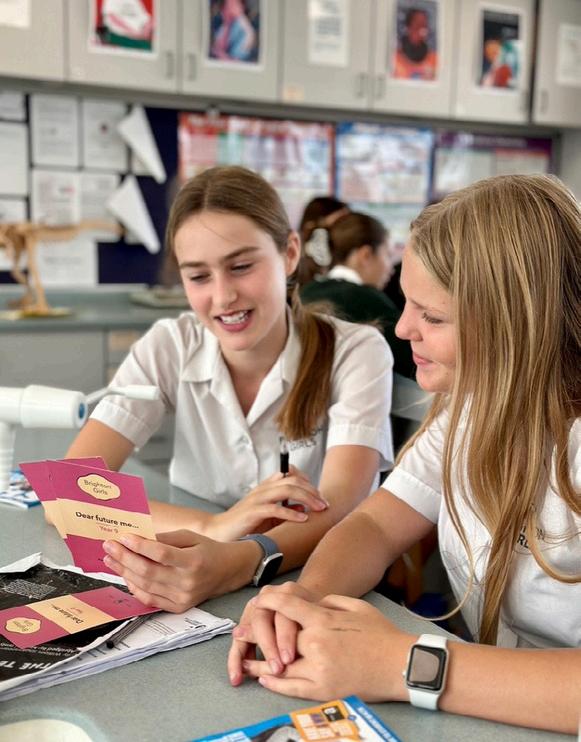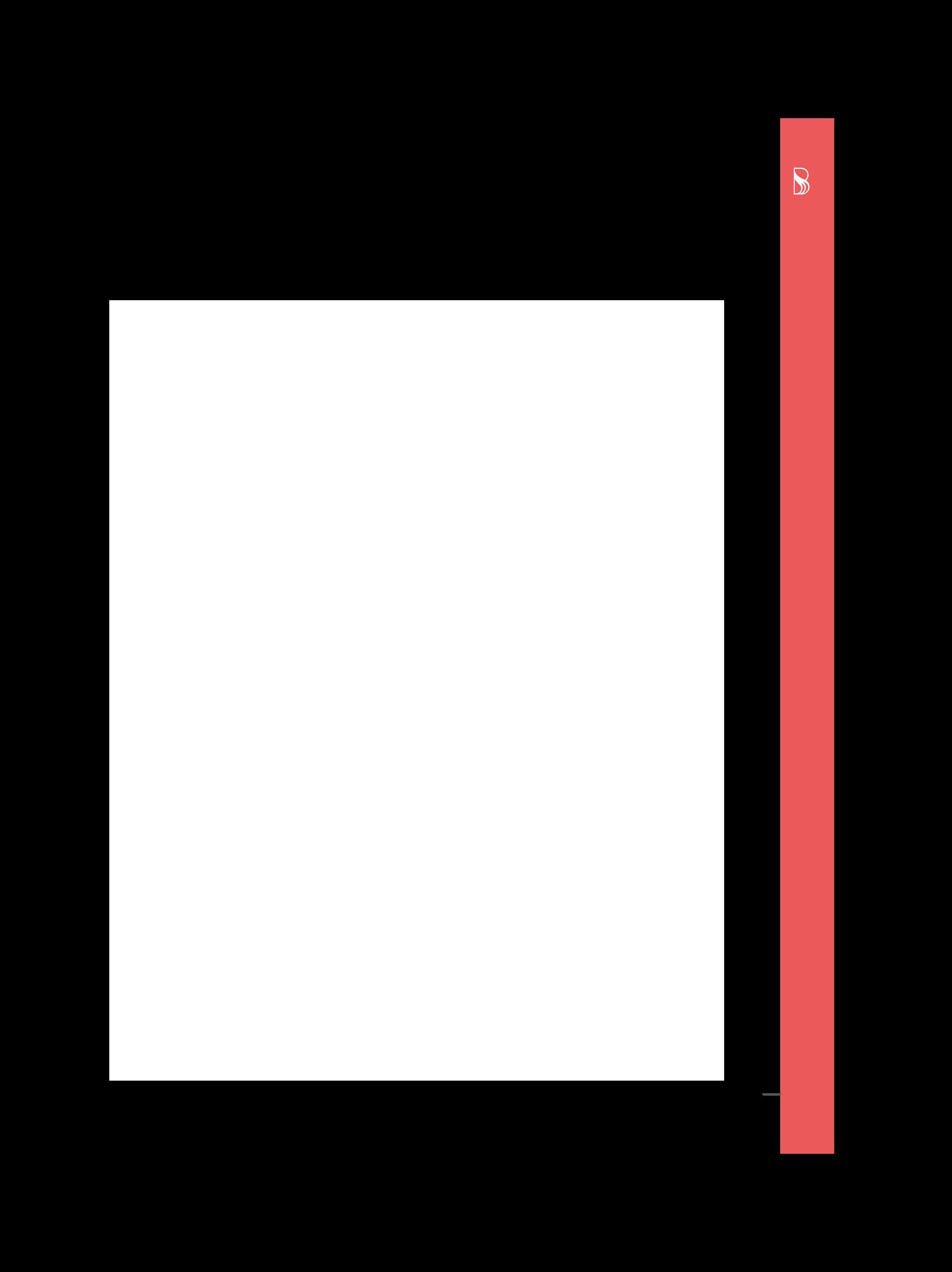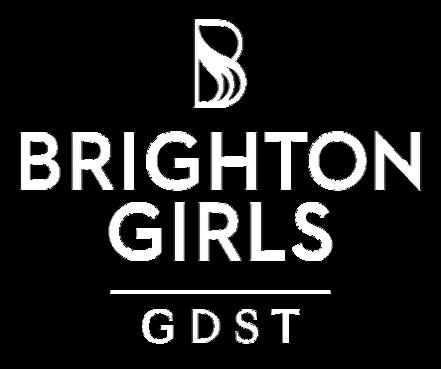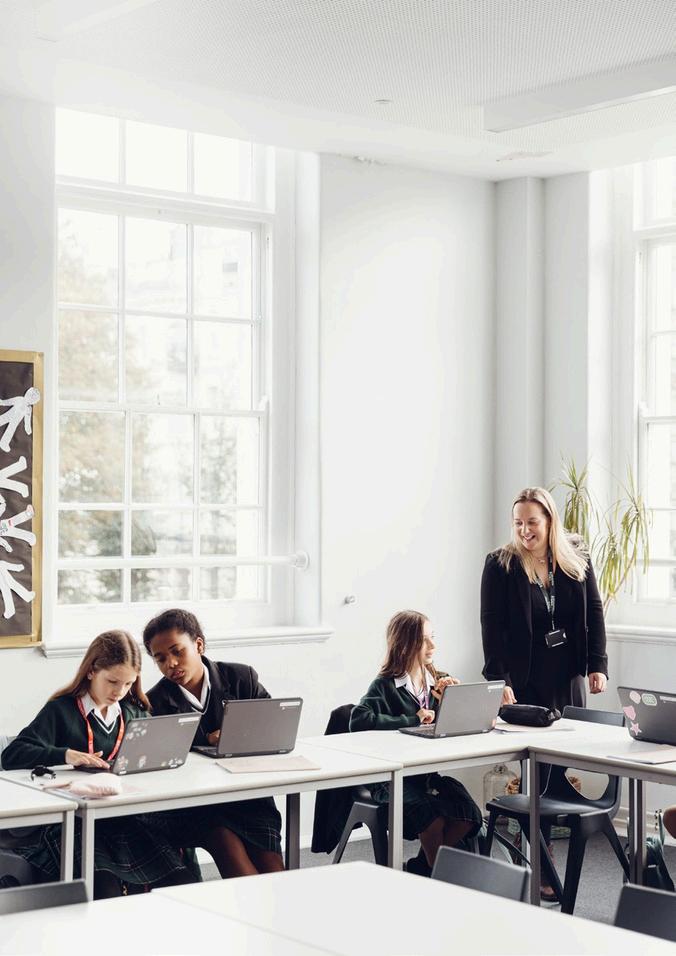
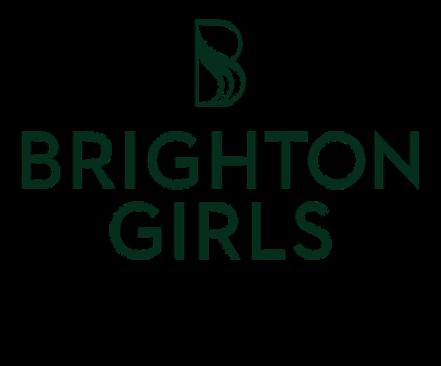



7, 8 & 9
Introduction from the Head
Art
Dance
Design Innovation
Drama
English
Food & Nutrition
Geography
History
Latin and Classics
Maths
Modern Foreign Languages
Music
Politics, Religion & Ethics
Science
Sport
Wellbeing
Key Stage 4 and beyond
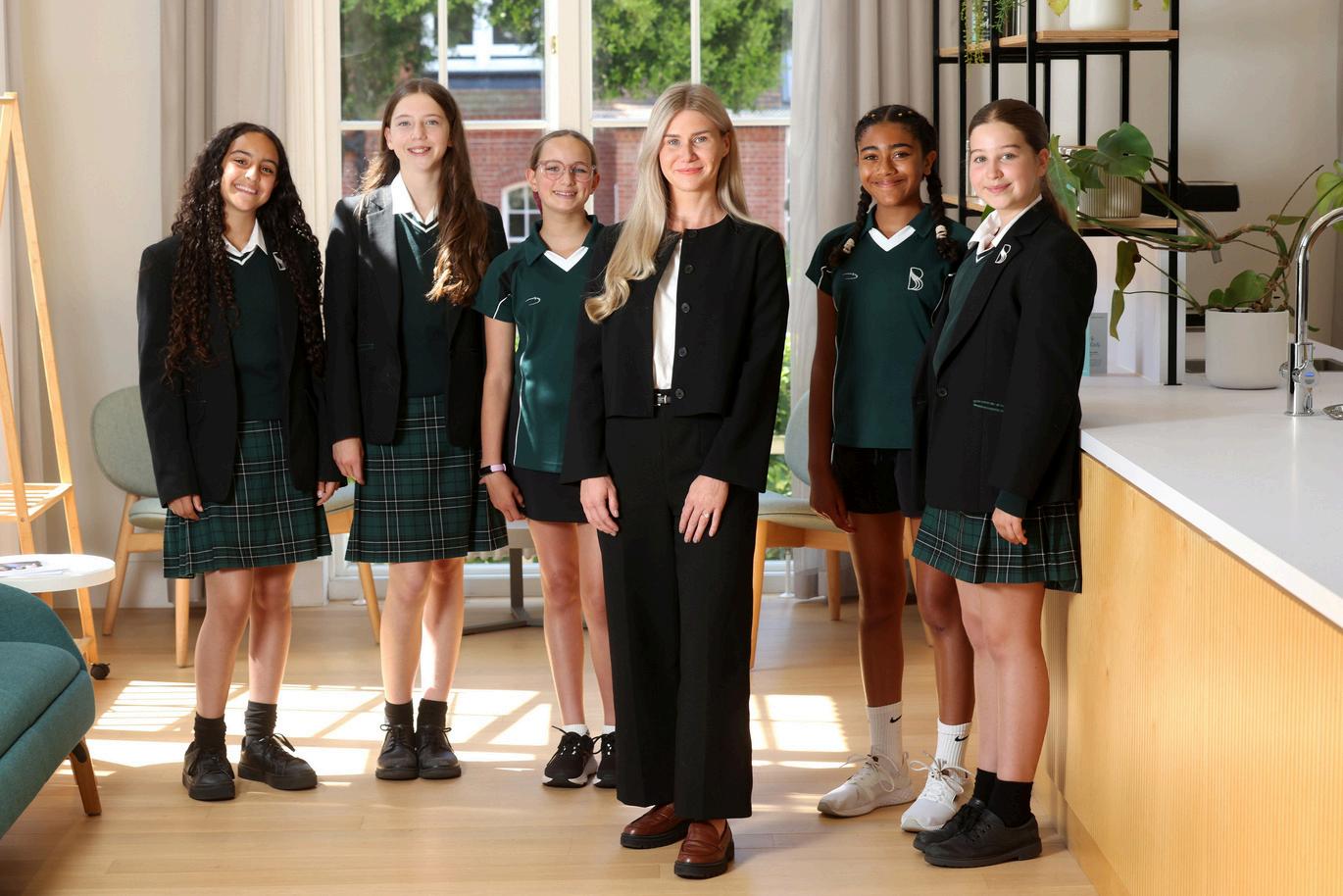
Welcome to the Key Stage 3 curriculum at Brighton Girls This booklet aims to give you
Our commitment to providing a broad curriculum ensures that students have the opportunity to explore a variety of subjects, empowering them to make informed choices as they approach decisions about their GCSE courses We believe that this approach not only enhances academic achievement but also cultivates a love for learning that extends beyond the classroom
Here at Brighton Girls, we embrace the value of being ‘bold ’ This principle is woven into the fabric of our educational philosophy. Our school aims to empower students to understand, value, and articulate their individual strengths. We encourage intellectual curiosity, instilling a genuine appreciation for learning for its own sake. Moreover, we equip our students to face challenges with confidence and creativity, fostering a mindset that aims high and instils belief in their ability to make a positive difference

Mel Shea Head
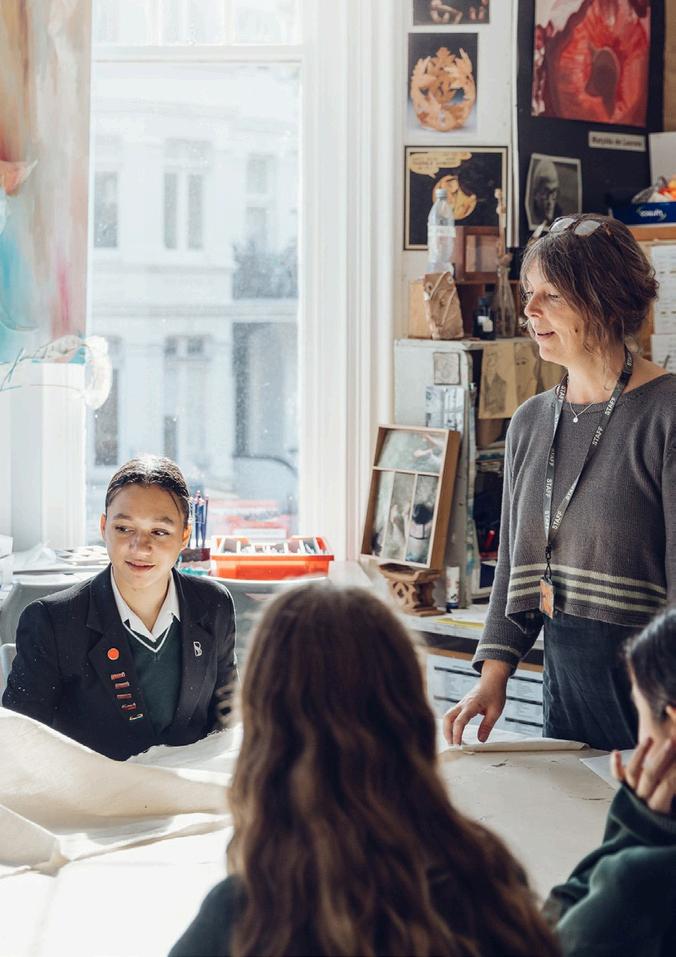
figures like Yayoi Kusama and Wassily Kandinsky guide students in finding their own artistic muses This year also integrates ICT skills, enhancing students’ ability for independent research and presentation
They have the unique opportunity to choose an ‘artist’, spanning artists, architects, designers, or sculptors, to inspire their comprehensive project This approach empowers them to delve deeply into diverse artistic expressions and techniques Students engage in hands-on experimentation with various materials, fostering a journey of self-discovery and artistic expression. Emphasising ICT skills for research and presentation, the curriculum equips students to effectively communicate their artistic visions. This year is a blend of personal choice, creative exploration, and skillful presentation, culminating in a body of work that is both deeply personal and expressive
InYear 8, students explore the fascinating blend of art and language, creating art that interweaves words and visuals in both two and three dimensions. This year ’ s curriculum challenges students to integrate words into their art, enhancing their work with a range of techniques from traditional to new media Students engage in printmaking, ceramics, colour exploration, collage, and drawing, discovering how words can powerfully shape artistic expression Inspirational artists like Menna Jenkins, Grayson Perry, and Lisa Kokin guide their exploration of gender and culture in art. The programme also emphasises ICT skills for independent research and presentations
In Year 9, students undergo a transformative journey in art, exploring art, design, sculpture, and architecture
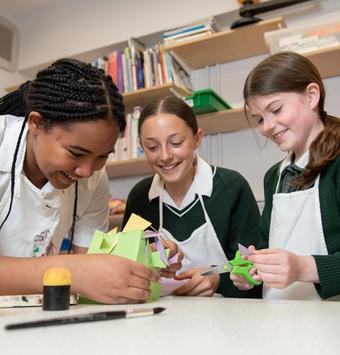
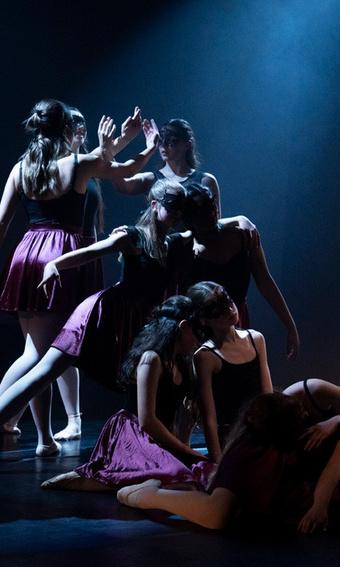
In Year 7 Dance, students explore
InYear 8 Dance, students immerse themselves in the dynamic world of Digital Dance, guided by Wayne McGregor’s “Infra ” They learn to embody McGregor’s distinctive movement style, integrating technology into their choreography and developing sequences using diverse choreographic tools Performance skills are honed to communicate character and mood, emphasising effective collaboration in small groups The curriculum also explores Brazilian culture through Samba, Capoeira, and Contemporary dance, focusing on Itzik Galili’s “A Linha Curva ” Students delve into the history of Capoeira, embodying movements from
“A Linha Curva” and creating original sequences Additionally, the course covers Hip Hop, inspired by Kenrick ‘H20’ Sandy’s “Emancipation of Expressionism ” Students explore Hip Hop’s origins, accurately embodying repertoire from the piece, and developing their own dance content Throughout the year, emphasis is placed on using performance skills for expression and working collaboratively to refine movement Year 8 Dance offers a vibrant and culturally rich experience, enabling students to express themselves through diverse dance styles and enhance their creative and performance skills
9
sequences. The curriculum emphasises creating and developing movement content using various choreographic tools and enhancing performances through expressive performance skills Students also engage in PerformancePro, focusing on key performance skills terms and definitions, demonstrating a range of skills in set phrases, and understanding how these skills enhance performance The course includes evaluating personal performances to identify and apply improvements. In ChoreoLab, students delve into choreographic terms and approaches to stimuli with creative curiosity They participate in workshop-style lessons exploring the seven choreographic processes defined by AQA for GCSE Dance, effectively using movement content to communicate intent, and studying motif and motif development, including choreographic structuring Year 9 Dance offers a comprehensive and creative exploration of dance, encouraging students to experiment with styles and refine their choreographic and performance skills
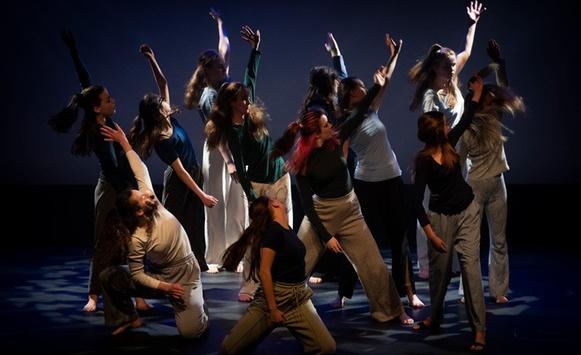
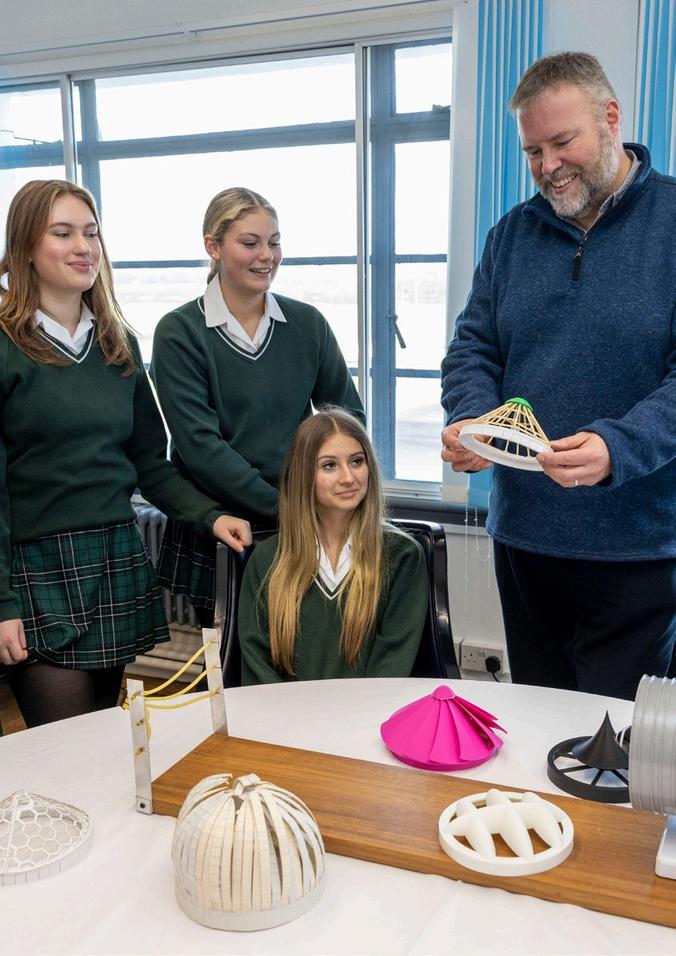
In Year 7, students embark on a journey to final products, equips students with a comprehensive skillset for the creative challenges of the design world
InYear 8 Design Innovation, students explore design thinking and apply it to new contexts, enhancing their problemsolving, critical thinking, and teamwork skills through practical projects They advance in using CAD software for digital modelling and prototyping, gaining hands-on experience with 3D printing and laser cutting technologies. Inspired by Thomas Heatherwick, students learn the iterative design process, understanding the relationship between form, function, and material The curriculum also delves into major design movements, bridging historical and contemporary design concepts In the workshop, students develop proficiency in tool use, safety, and advanced finishing techniques, and refine their sketching skills for visual representation of ideas. This approach to model making, from initial sketches
In Year 9 at Brighton Girls, design innovation takes centre stage as students tackle complex, real-world projects, inspired by luminaries like Zaha Hadid and Iris Van-Herpen They delve into advanced problem-solving and usercentred design, creating functional products with a focus on ergonomics and social impact Emphasising teamwork and leadership, the curriculum guides them through the intricate design process from concept to prototype Students explore the integration of fashion and technology, architectural modelling, and storytelling through design, drawing on Yinka Ilori’s approach An introduction to GCSE D&T coursework and a study of major design movements like Art Deco and Bauhaus enrich their understanding, blending theoretical knowledge with practical application for a comprehensive experience in design innovation
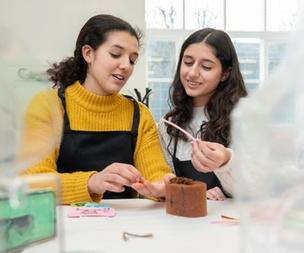
In Year 7 Drama, students are immersed in the enchanting world of theatre, starting with an exploration of “Harry Potter and the Cursed Child.” They engage in diverse workshops focusing on role-play, character development, and script work, using engaging themes like “Darkwood Manor ” The curriculum covers essential elements of theatre, from stage positioning to genre styles, and digs into the responsibilities of different theatre makers Practical projects include designing costumes and sets for a script titled ‘Toys,’ and creating a silent movie, paying homage to the art of mime and slapstick comedy Throughout the year, students respond creatively to various stimuli, reflecting on social, cultural, and political themes, fostering a deep understanding and appreciation for the collaborative and dynamic nature of drama
In Year 8 Drama, students immerse themselves in the intriguing world of “The Missing Person,” employing explorative strategies like role play, improvisation, and narration to delve into theatrical expression They explore the horror genre, mastering the art of creating tension and atmospheric effects, and navigate the complexities of Shakespearean drama with “The Taming of the Shrew ” This year ’ s curriculum also transforms students into playwrights and designers, where they conceptualise and bring to life their own short plays, encompassing all aspects of production. Additionally, they develop critical skills in writing live theatre reviews, enhancing their ability to
analyse and appreciate the nuances of live performances This dynamic year of drama education offers a comprehensive journey through various dramatic styles and roles, enriching students’ understanding and appreciation of the theatrical world
In Year 9 Drama, students engage in a rich, multifaceted exploration of theatre They start with Verbatim Theatre, analysing the London Riots and the power of social media, and create their own impactful pieces. The course then delves into the theme of homelessness, sparking discussions on social hierarchy and enabling students to express themselves through monologues They also immerse in an original play, balancing the roles of directing and acting, and explore the teachings of drama practitioners like Stanislavski and Artaud, uncovering techniques from naturalism to the Theatre of Cruelty These studies bring to life key concepts like emotional memory and primal sounds in performance The year culminates with an introduction to AQA GCSE Drama, focusing on devising drama from stimuli, fostering students’ creativity and depth in their theatrical journey This dynamic year of drama education enriches students with a diverse array of theatrical styles and techniques, setting a strong foundation for their future studies.
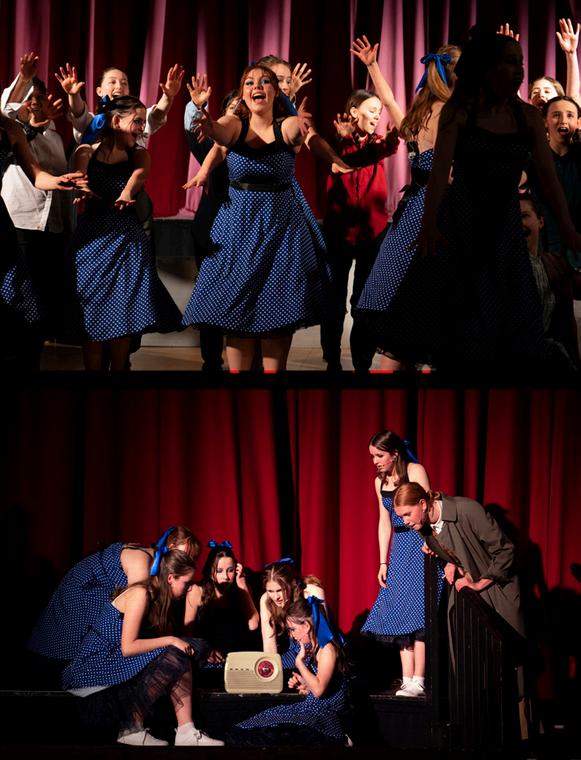
In Year 7, students begin on a comprehensive literary journey, beginning with Shakespeare’s “The Tempest ” They explore life and theatre in Shakespeare’s era, delving into the characters, plot, themes, and dramatic devices of the play, and learning to write analytically about language and the writer’s ideas The curriculum then transitions to Creative Fiction Writing, where students develop their storytelling skills using a range of literary devices and structures, focusing on planning, proofreading, and revision In Non-Fiction Writing, they learn to craft impactful prose, applying similar writing tools and refining their work through careful planning and revision The course also includes studying Nature Poetry, where students read, enjoy, and analyse poems from the 19th to 21st centuries, developing skills to write thoughtfully about poetry The year concludes with a study of “The Bone Sparrow,” examining its characters, plot, themes, and literary devices, and enhancing students’ ability to discuss language and the author’s intentions This diverse Year 7 English curriculum fosters a deep appreciation for literature and hones students’ analytical and creative writing skills
In Year 8 English, students look into Shakespeare’s “Romeo and Juliet,” exploring life and theatre in the Elizabethan era and analysing the play’s characters, plot, themes, and dramatic devices They learn to critically write about language and the author’s ideas The course also includes Creative Fiction Writing with a ‘Film to Narrative’ focus, where students craft stories inspired by classic film scenes using various literary
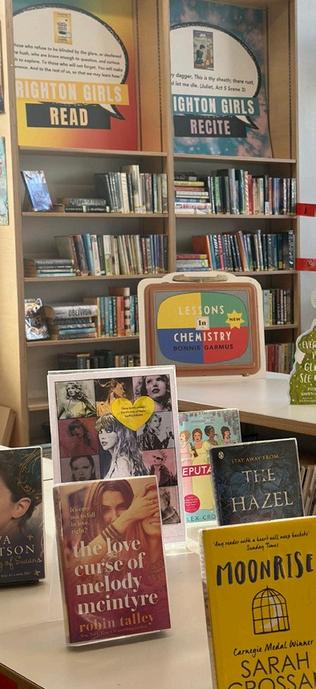
devices and structures, emphasising planning, proofreading, and revision In Non-Fiction Writing, students develop skills to write compelling prose, applying literary tools and refining their work through careful planning and revision The curriculum features the novel “My Name Is Leon” by Kit de Waal, examining its characters, plot, themes, and literary devices Additionally, students study the poetry of Seamus Heaney, learning to
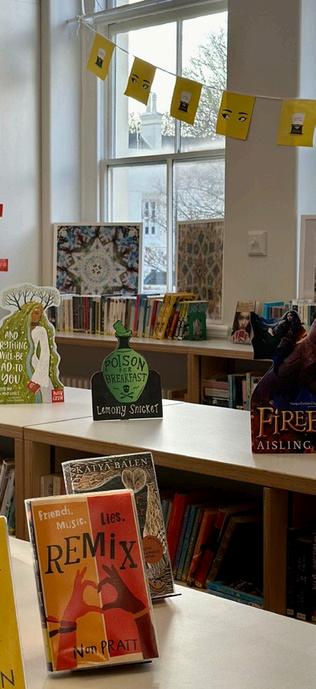
read, enjoy, and analyse his works from the 20th to 21st centuries, and writing about poetry by linking ideas and themes to relevant contextual information Year 8 English provides a rich literary experience, enhancing students’ understanding and appreciation of diverse genres and styles, and honing their analytical and creative writing skills
In Year 9 English, students study Shakespeare’s “Macbeth,” exploring its characters, plot, themes, and dramatic devices They develop analytical writing skills, focusing on language, structure, and the author’s ideas, with relevant links to historical context The curriculum includes Creative Fiction Writing in the Gothic Genre, where students use 19th-century Gothic fiction for inspiration, applying literary devices and structures, and refining their writing through planning and revision In Non-Fiction Writing, the focus is on crafting persuasive speeches, utilising a writer’s toolkit to create impactful prose, and honing skills in planning and revision. Students also study “A Christmas Carol,” examining its characters, plot, themes, and literary devices, and learning to write critically about language and structure with contextual links Additionally, the course covers “Diverse Voices in Poetry,” encouraging students to enjoy, read, and respond to poetry from diverse poets about varied experiences, and to link ideas about language and structure to relevant contexts Year 9 English offers a comprehensive literacy experience, enhancing students’ understanding of classic and contemporary works and fostering their critical thinking and creative writing abilities
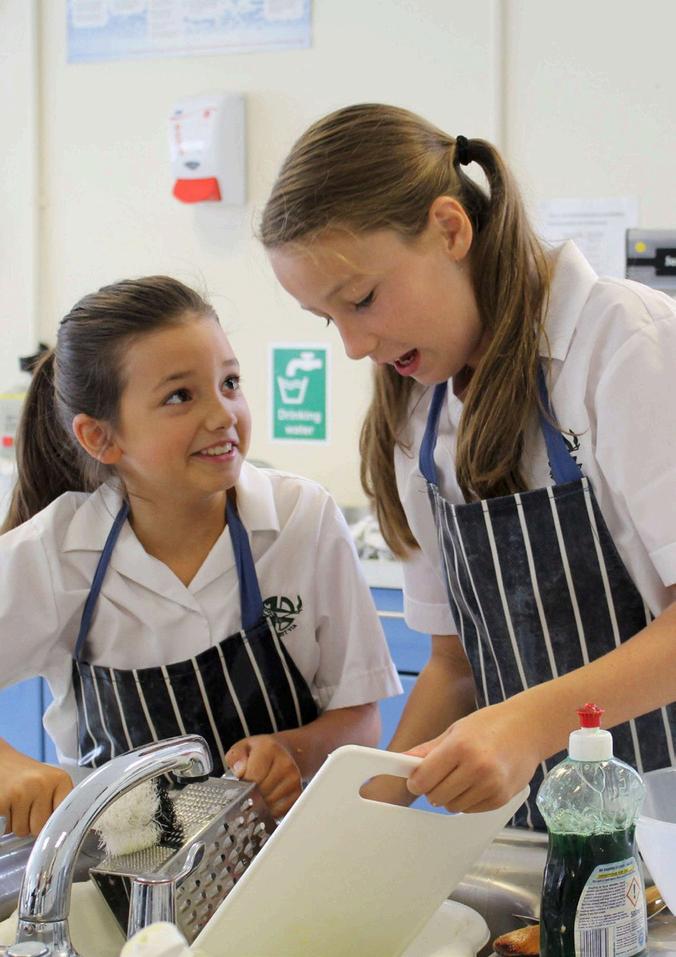
In Year 7 Food and Nutrition, students begin on a journey of culinary discovery, honing essential skills in food preparation and cooking They learn to master basic techniques like peeling, chopping, and the art of rubbing in, preparing dishes such as French bread pizzas, fruit and pasta salads, scones, and crumbles. Emphasising safety, students become adept at using the hob and oven while adhering to hygiene protocols to ensure a safe cooking environment The curriculum also introduces them to sensory analysis, teaching them to use star diagrams to evaluate the sensory properties of food, enhancing their appreciation and critical evaluation of culinary experiences Students delve into the language of cooking, understanding common abbreviations and exploring essential kitchen equipment Furthermore, they develop evaluative skills, learning to assess and improve their culinary creations and work efficiency This year in Food and Nutrition is a blend of practical skill development, safety awareness, and sensory appreciation, laying a solid foundation for their culinary journey
In Year 8 Food and Nutrition, students advance their culinary skills, creating a variety of dishes such as pasta sauce, macaroni cheese, calzone pizza, homemade pasta, fruit muffins, stir-fries, and fruit cobbler The curriculum goes beyond cooking techniques to include a thorough understanding of healthy eating and dietary guidelines Students explore the 8 Dietary Guidelines and the Eatwell Guide, learning to craft wellbalanced diets while focusing on reducing salt, sugar, and fat and incorporating
beneficial nutrients like omega-3. They gainessential knowledge about food labelling, understanding the importance of information on labels to make informed choices in the marketplace An integral part of the course is learning recipe adaptations, where students are taught to modify recipes to enhance nutritional value without losing flavour or texture, aligning with healthy eating practices This year in Food and Nutrition not only enhances their culinary repertoire but also instils an understanding of nutrition and health, equipping them with skills for lifelong healthy eating habits.
In Year 9 Food and Nutrition, students
in Oceania, covering a range of topics from droughts in Australia and biodiversity in the Daintree Rainforest to tourism in Micronesia and earthquake studies in New Zealand The year culminates with an indepth exploration of North America, examining the Hoover Dam, water insecurity in Flint, food deserts along the Mississippi, migration patterns, and the dynamics of border towns Students also engage with complex topics like democracy, trade, and unconventional energy resources, gaining a comprehensive understanding of each continent’s unique geographical challenges and marvels This year in Geography offers a vivid tapestry of learning experiences, fostering a deep appreciation for the world’s diverse environments and societies
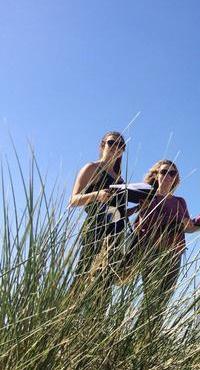
India, and urbanisation in Japan They also examine Africa’s vast landscapes, from the Sahara Desert’s challenges to the Nile River’s significance in Egypt The journey extends to the Middle East, analysing water scarcity, oil politics, and the complexities of urban development in Dubai. Year 8 Geography culminates with an exploration of Antarctica, delving into climate change, scientific research, and international treaties This year provides a comprehensive and engaging exploration of diverse continents, enhancing students’ geographical skills and knowledge, and fostering a nuanced understanding of global environmental and cultural dynamics

In Year 9 Geography, students focus on Africa, exploring a variety of themes that illustrate the continent’s dynamic nature and global impact They study Ghana’s Year of Return initiative, demonstrating the power of rebranding, and delve into topics like trade dynamics, agricultural adaptation through Fonio in West Africa, renewable energy in Namibia, and women ’ s empowerment The curriculum covers the challenges of flooding, the cultural significance of Nollywood, the diversity of African biomes, and migration complexities Students also explore energy resources, assessing the advantages and drawbacks of fossil fuels and renewables, studying
energy production and distribution, and investigating unconventional sources like fracking The year culminates with an indepth study of Earth’s structure, tectonic plates, and natural hazards like volcanoes and earthquakes, providing students with a comprehensive understanding of tectonic hazard management This intensive Year 9 Geography course offers a multifaceted perspective on Africa’s geographical features and issues, along with a deeper understanding of Earth’s dynamic processes and their impacts
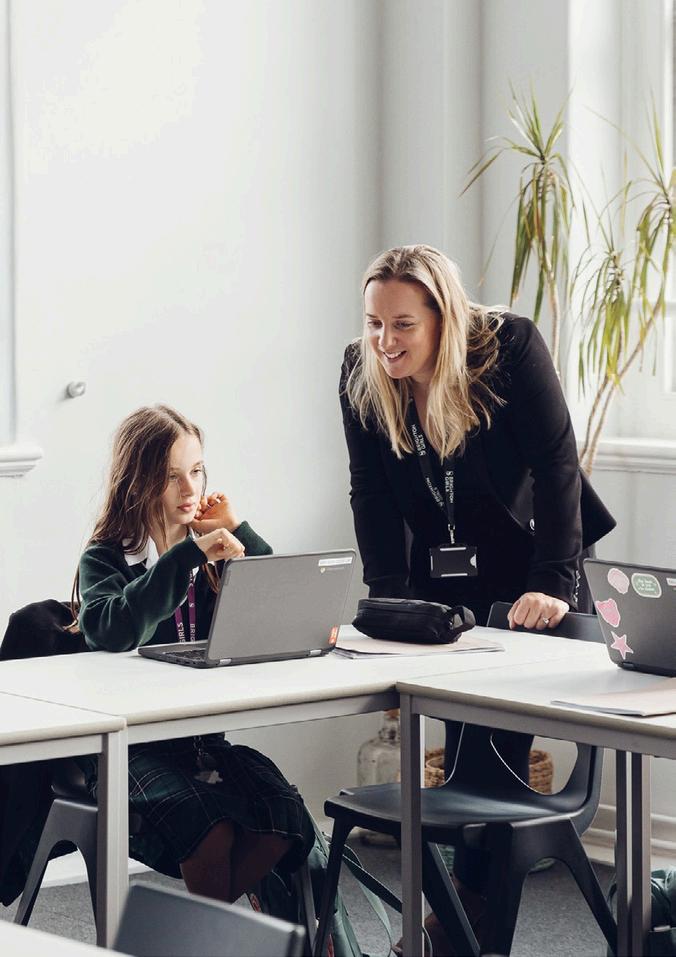
In Year 7 History, students explore the transformative period of William of Normandy’s conquest of England They delve into the intriguing dynamics between Edward the Confessor, Harold, and William, and the decisive Battle of Hastings The curriculum covers the dramatic Harrying of the North, the rise of castles, the establishment of the feudal system, and the detailed record-keeping of the Domesday Book. Students also investigate the daily lives of people in the Middle Ages, contrasting urban and rural lifestyles, and examining sanitation, law and order, entertainment, the role of women, and the influence of the Church and mediaeval religion Additionally, they study mediaeval medicine, exploring its limitations, the devastating impact of the Black Death, the role of caregivers, and aspects of mediaeval childcare This year in history provides students with a vivid understanding of a pivotal era, highlighting its lasting impacts on English history and society
In Year 8 History, students explore the complex world of 16th-century England, unravelling the interplay of religion, succession, and governance They examine the Break with Rome, the Dissolution of the Monasteries, the Pilgrimage of Grace, and religious shifts under Henry VIII’s successors, including the study of ‘Black Tudors.’ The curriculum then shifts to the societal dynamics of Tudor and Stuart England, exploring social divisions, the status of women, poverty, and measures against begging Students also analyse the reigns of James I and Charles I, the
In Year 9 History, students trace the pivotal events leading to the abolition of slavery, examining the Slave Trade’s complexities, including triangular trade, the harrowing “middle passage, ” plantation life, and resistance against enslavement, culminating in the abolition in the British Empire in 1807 The curriculum then explores the transformation of 19thcentury British life, analysing the pre-1832 electoral system, the Peterloo Massacre, the evolution of electoral reforms, the Chartist movement, and the women ’ s suffrage movement Moving into the 20th century, students study the experiences of Black Britons, reflecting on the Empire Windrush’s arrival, the Notting Hill Riots, the Bristol Bus Boycott, anti-immigration politics, and Asian immigration from 1967 to 1972 This comprehensive year in history provides a deep understanding of crucial historical movements and events, highlighting their significance and impact on modern British society and beyond.
In Year 7 Latin, students look into the captivating world of ancient Rome, intertwining language learning with cultural and historical insights The course begins with “Chapter I – Subura,” focusing on 1st, 2nd, and 3rd person singular verbs, exploring life in the Subura and the role of women in Rome. “Chapter II - Roma’’ introduces students to the nominative and accusative singular, covering declensions and the significance of the Roman Forum. In “Chapter III - Ludi,” the curriculum expands to nominative and accusative plural, and 3rd person plural verbs, with an engaging focus on chariot racing “Chapter IV - Religio’’ explores 1st and 2nd person plural verbs, introducing neuter nouns and delving into Roman religion and the emergence of Christianity. The final chapter, “Chapter VSanitas,” is dedicated to infinitives and Roman medicine This comprehensive approach in Year 7 Latin not only provides students with a solid foundation in classical languages but also immerses them in the rich cultural and historical context of ancient Rome, sparking a lasting interest in Latin studies
InYear 8 Latin, students continue their
the imperfect and perfect tenses, offering insights into life in Roman Britain and the diverse foods of the Roman Empire. In “Chapter VIII - Rebellio,” students learn about the dative case, delving into the Roman invasion of Britain and the story of Boudicca’s rebellion The year culminates with “Chapter IX - Aquae Sulis,” where students study adjectives, the art of cursing in Latin, and daily life in Aquae Sulis and Vindolanda. Through this engaging curriculum, Year 8 Latin students not only enhance their language proficiency but also gain a deeper appreciation of the rich cultural and historical legacy of ancient Rome, setting a strong foundation for further classical studies.
In Year 9 Classics, students embark on an enlightening journey through Greek Religion and Roman Entertainment, uncovering the rich legacies of these ancient civilisations They delve into the world of Olympian gods and Greek mythology, exploring the creation myths, sacred rituals, and the mystique of the Oracle at Delphi This exploration extends to Greek Theatre, where students examine the architecture, tragedies, and intricate costume designs Shifting to Roman Entertainment, they immerse in the exhilaration of chariot races and the spectacle of gladiator games, understanding the Roman Empire’s transformative impact Through this captivating curriculum, students enhance their critical thinking and historical analysis skills, connecting deeply with the cultural foundations that shaped Western civilisation
InYear 9 Latin, students continue learning
Their study then moves to ancient Rome where the great fire of Rome is explored together with imperatives and prohibitions in the language. Further topics studied include the theatre in the ancient world and mosaic making whilst in the language, relative clauses and the future tense are introduced The Year 9 Latin course sets up solid foundations for the study of Latin at GCSE level.
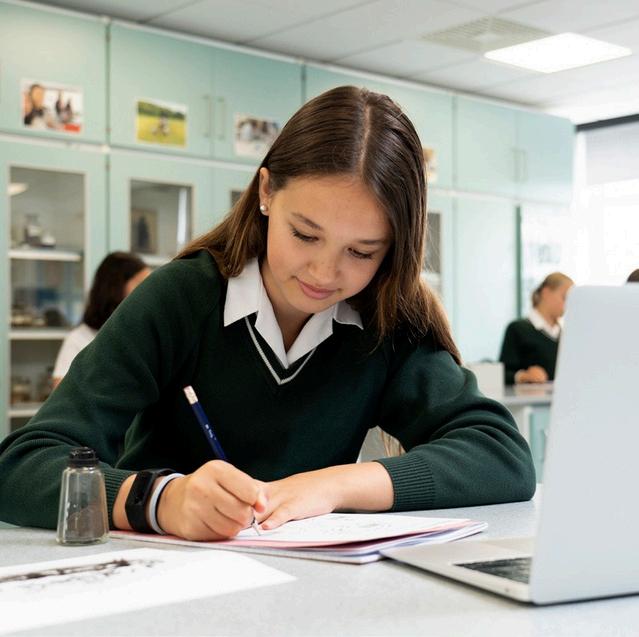
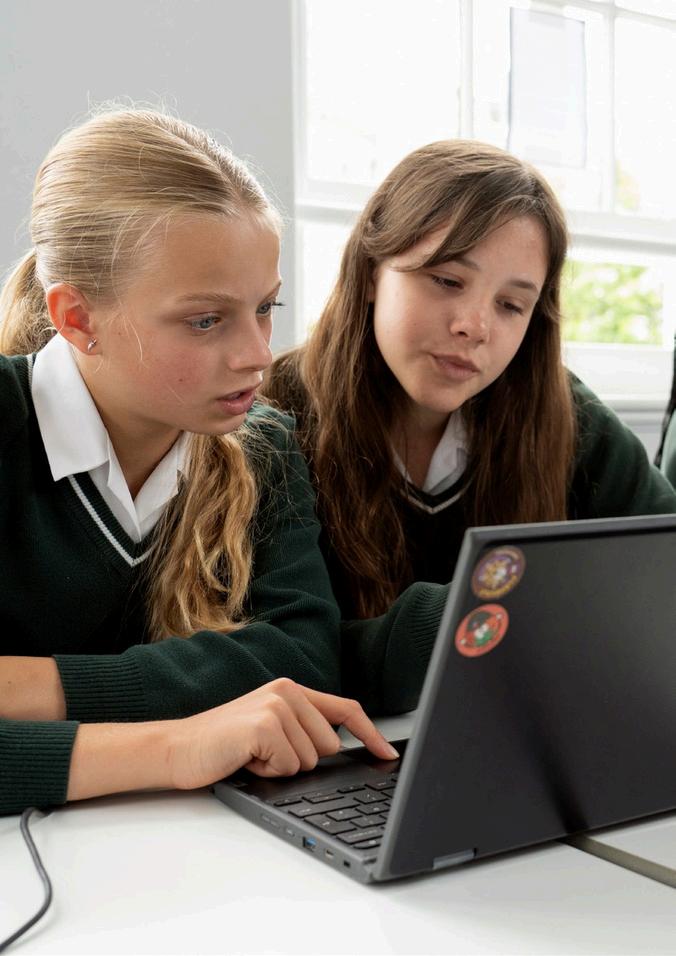
In Year 7 Maths, students start a foundational mathematical journey, beginning with divisibility, index notation, and the exploration of squares, cubes, and prime factors. They tackle highest common factors and lowest common multiples, then advance to understanding the arithmetic of negative numbers and basic algebra, including algebraic conventions, collecting like terms, expanding brackets, formula substitution, and solving linear equations. The curriculum also covers sequences like triangle and Fibonacci numbers, linear sequences, and the nth term, as well as coordinates and linear graphs
Students delve into decimals, fractions, and percentages, focusing on ordering, simplifying, and calculation methods
The year further includes topics like ratio and proportion, problem-solving in functional maths, area and volume, angles and shapes, and the study of 3D shapes, symmetry, and transformations This comprehensive approach in Year 7 Maths lays a robust foundation for students, equipping them with essential skills and knowledge for advanced mathematical concepts in future years
In Year 8 Maths, students explore the fascinating world of transformations, mastering reflections, rotations, translations, and enlargements, along with understanding congruence in geometric shapes They explore probability, learning to estimate and calculate simple probabilities, and dive into data handling, including collection methods, frequency tables, and statistical measures like mode, median, mean, and range. Algebraic foundations are strengthened with index notation, inequalities, solving
linear equations, expanding brackets, and working with formulae Arithmetic skills are refined with decimals and fractions, including recurring decimals and percentage problems Students also tackle sequences, including the nth term of linear and quadratic sequences, and investigate straight line graphs and rates of change The curriculum covers compound measures, calculations involving circles and prisms, scale drawing and bearings, and geometric proofs and calculations for angles and shapes Year 8 Maths offers a comprehensive exploration of mathematical concepts, skillfully preparing students for more complex mathematical challenges in the future
In Year 7 French, students begin their linguistic journey with “Point de départ,” focusing on responding to classroom instructions and accurately answering basic questions. The course includes a strong foundation in French phonics to aid pronunciation and comprehension The unit “Ma famille” teaches students how to discuss nationality, describe physical appearances and personalities, and talk about pets In “Mon collège,” they learn to articulate details about their school, school day, subjects, timetable, and express their preferences and dislikes, along with telling the time The “Chez moi” section enables students to describe their homes and discuss various activities they do there, using appropriate verbs Lastly, in “Les loisirs,” students explore how to converse about sports they participate in or watch. This comprehensive Year 7 French curriculum provides a solid base in the language, covering essential topics and skills that set the stage for further learning and fluency in French
In Year 7 Spanish, students start their
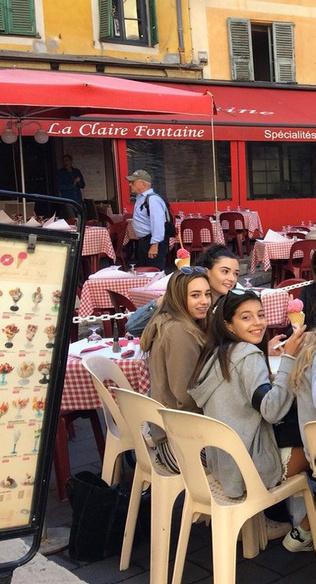
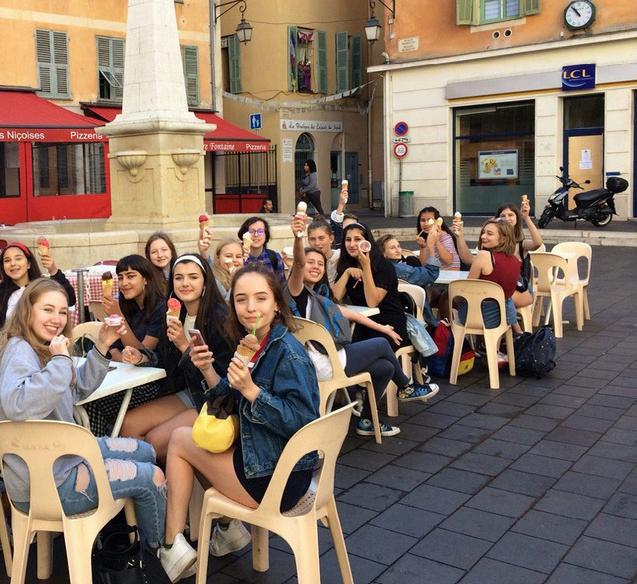
In Year 8 French, students enhance their language skills through a diverse curriculum
Starting with “Manger et boire,” they express opinions about various foods, discuss their meals using the partitive article, and explain dietary choices using negation.
In “Le weekend dernier,” they describe past events using the passé composé with both regular and irregular verbs, and verbs that conjugate with être The study of the film “Les Choristes” allows students to talk about its genre, plot, characters, and settings They practise describing scenes in both the present tense and passé
In Year 8 Spanish, students expand their language skills through engaging topics. “Mis vacaciones” teaches them to discuss holiday destinations, including details of past holidays, modes of travel, accommodations, and activities, while introducing the use of the preterite tense In “Comer y beber,” students express opinions on different foods, describe their meal habits, and use negation to talk about dietary preferences. The study of the film “Valentín” allows them to describe its plot, setting, and characters, recount specific scenes, and make future predictions using the near future tense Students then apply their knowledge in “Planning a trip to a Hispanic country,” where they work in groups to plan a trip, including transportation, accommodation, and activities, and present their plans to the class Additionally, the curriculum covers “Poetry and music,” enabling students to discuss themes of various poems, express opinions on songs and singers, and justify their viewpoints. Year 8 Spanish not only strengthens students’ linguistic abilities but also enriches their cultural appreciation, paving the way for more complex language studies
dedicated to researching inspirational women from Francophone countries, culminating in a creative task where students present a biography of themselves at age 50 The year concludes with a focus on revising for summer exams and preparing for the upcoming challenges of Year 10 This comprehensive curriculum in Year 9 French not only enhances linguistic skills but also broadens cultural awareness and encourages creative expression, laying a strong foundation for future studies in French In Year 9 Spanish, students explore the theme of lifestyle and routine in Hispanic countries They engage in discussions about daily routines on normal and special days, activities during holidays, and the daily routines of celebrities The unit “Subversive fairy tales” allows them to read traditional fairy tales and then creatively craft their own, utilising the preterite and imperfect tenses. Students also undertake the exciting task of planning a visit to Seville This includes writing an introductory letter to an imaginary exchange family, role-playing sightseeing activities, practising conversations with host families, and planning future visits A significant aspect of the curriculum involves studying inspirational women, where students talk and write about inspirational figures in their lives and research notable women from the Hispanic world. They write a future biography of themselves at age 50 and prepare for a press conference, enhancing their creative and expressive skills Additionally, the course includes studying film extracts and songs to further enrich their cultural understanding. The year concludes with preparations for end-of-year exams and gearing up for the academic rigour of Year 10 Year 9 Spanish provides a diverse and engaging language learning experience, blending cultural exploration with advanced linguistic skills
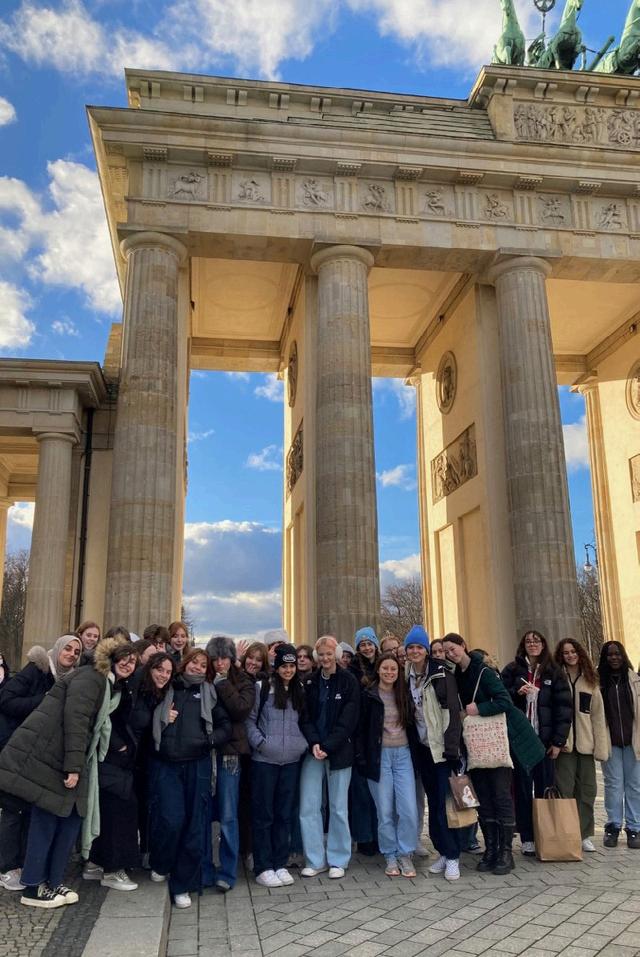
In Year 8 Music, students start on a vibrant exploration of Jazz, starting with West African drumming techniques including Djembe and understanding cross rhythms, ostinato, and polyrhythm The curriculum progresses to the roots of Jazz, delving into spirituals, work songs, and the historical context of the slave trade Students then explore Blues Music, focusing on 12-bar blues composition and improvisation, and learn to label chords with Roman numerals and chord
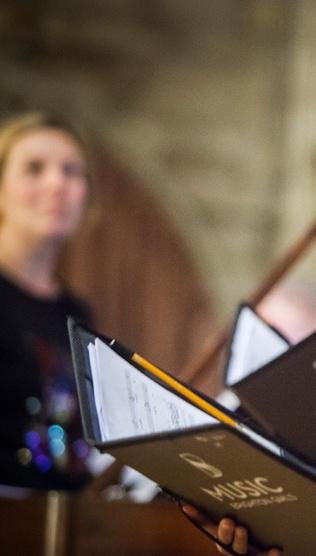
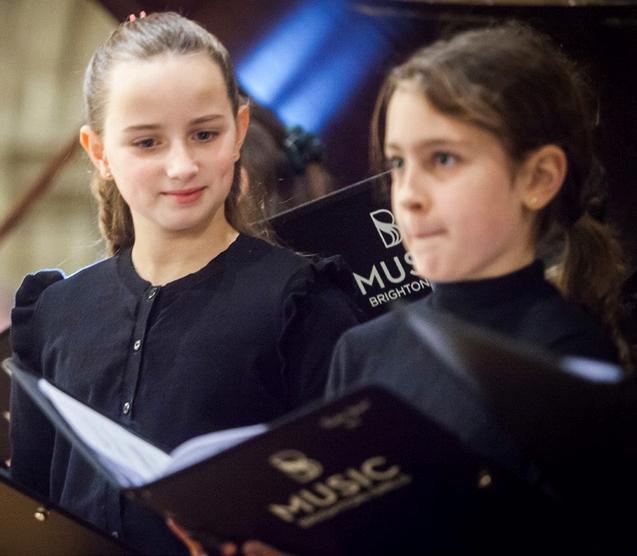
In Year 9 Music, students begin a captivating exploration of Film Music, delving into its history, including the era of Silent Movies and the concept of ‘mickey mousing’ They study the influential work of John Williams and the use of Leitmotif, culminating in a horror film composition project that incorporates leitmotif, dissonant harmony, and sound effects The curriculum then transitions to the Baroque, Classical, and Romantic Periods, where students analyse key features through iconic works. They engage in performance and sequencing projects, such as a ‘Pachelbel canon ’ rendition and a ‘Beethoven 5 re-mix’ A listening and performance task centred on Clara
Schumann’s Scherzo offers a deeper appreciation of these periods The journey continues with Minimalism, where students perform and compose pieces inspired by ‘Perpetuum mobile’ by the Penguin Cafe Orchestra, learning about phase-shifting and motivic development, and exploring the minimalist genre with a focus on Steve Reich The year concludes with an immersion into Folk/Fusion, analysing the British folk tradition, particularly Scottish music, folk instruments, and the fusion of folk with rock/pop and technology, highlighted by studying ‘Skye Wauling Song’. This comprehensive curriculum allows students to experience a rich tapestry of musical genres, enhancing their understanding, creativity, and appreciation of diverse musical styles
In Year 7 Religious Studies, students start an insightful exploration of fundamental questions shaping personal and global perspectives They delve into philosophical concepts like Physicalism and Dualism, examining the existence of the soul and the impact of social media on these beliefs The curriculum includes an analysis of theism, agnosticism, and atheism, emphasising the importance of respecting diverse worldviews Students differentiate between facts and beliefs, exploring theistic beliefs and the influence of atheism They discover Professor Ninian Smart’s 7 dimensions of religion, analyse commonalities and differences among various religions, and discuss potential conflicts between religion and science. The course also addresses sexism in religion, feminist theology, and the role of women in faith, along with hermeneutics and the influence of secular views on religious beliefs A critical evaluation of the statement ‘Religion should always adapt to society’s changing views’ caps off the year Year 7 Religious Studies at Brighton Girls offers a foundational journey into diverse religious and philosophical concepts, fostering critical thinking and a deep understanding of various belief systems
InYear 8 Religious Studies, students look into an engaging exploration of Islam, Feminism, and the inspiring story of Malala Yousafzai. They study Malala’s
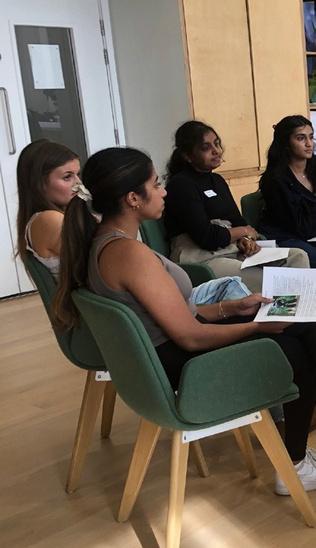
life, the rise of extremism in her region, and its impact on women, analysing how she challenges misconceptions about Islam The curriculum includes defining Islamophobia, examining its spectrum from moderation to extremism, and understanding its rise in the UK, with a focus on addressing media bias to combat Islamophobia Students examine key events in the life of Muhammad, the role of Khadija, his teachings on women, and debate whether Muhammad can be seen as an early Muslim feminist. They explore Alaa Murabit’s perspectives on feminism in Islam, emphasising the importance of hermeneutics in interpreting the Qur’an and the relationship between culture and religion The significance of the Five Pillars of Islam and their equal relevance to both genders is also studied This year
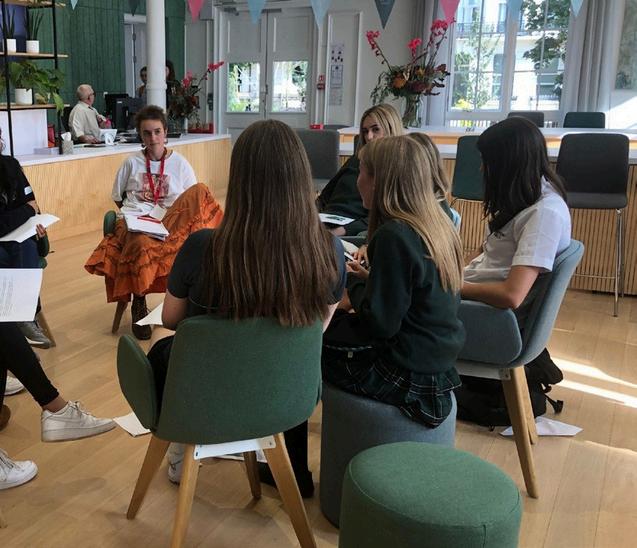
in Religious Studies provides students with a comprehensive understanding of Islam and feminism, encouraging critical thinking about media bias and the diversity of interpretations within religious contexts, fostering an appreciation for the complex interplay between religion, culture, and individual experiences
9
In Year 9 Religious Studies, students start on an in-depth exploration of morality and worldviews, critically engaging with diverse philosophical, religious, and contemporary perspectives They examine the origins of morality and the concept of conscience, and delve into views on sexual relationships, marriage, divorce, remarriage, and gender equality from Buddhist, Christian, and non-
religious standpoints Environmental ethics, the treatment of animals, perspectives on abortion, attitudes towards euthanasia, and views on human rights and social justice are scrutinised across these worldviews. Students also analyse perspectives on prejudice and discrimination, the philosophical problem of evil, and the perceived conflict between science and religion. Additionally, the curriculum includes an examination of the Design Argument and the First Cause Argument from both religious and philosophical viewpoints. This year in Religious Studies is designed to foster critical thinking and understanding of the complex intersections of ethics, religion, and philosophy, equipping students with a nuanced comprehension of contemporary moral issues and broader existential questions
In Year 7 Science, students begin on an excitingjourney through a variety of scientific realms, blending practical skills with fascinating theoretical concepts The year begins with “Introduction to Lab-based Science,” where students learn about lab safety, Bunsen burner usage, practical experiment planning and execution, and basic data analysis, including graphing skills “Journey to Hogwarts” introduces them to the world of static electricity, magnetism, forces (including moving objects without touch), acids and alkalis (used in potion making), simple electrical circuits, states of matter, gears, and the classification and adaptation of fantastic beasts The “Welcome to Jurassic World” topic delves into advanced classification, diet and digestion, the evolution of the atmosphere, extinction and preservation, microscopy, cells, DNA, evolution, survival techniques, and students even design their own Jurassic world The year concludes with “Galaxies Collide,” exploring space, the solar system, the life cycle of stars, satellites, the concept of days, months, and seasons, challenges of living on another planet, and some forces This diverse and engaging curriculum in Year 7 Science not only introduces fundamental scientific concepts but also sparks curiosity and imagination in the young minds, setting a solid foundation for their future scientific explorations
In Year 8 Biology, students look into the human body and plant life, discovering the complexities of the human skeleton, respiration, and reproduction. They study
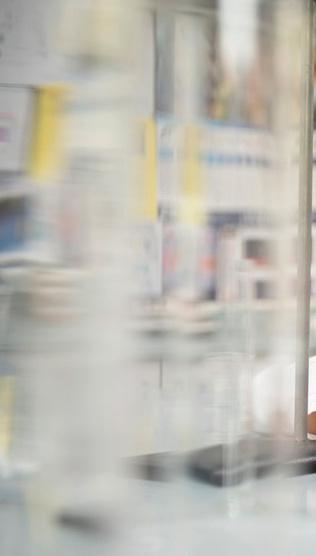
the structure and function of skeletons, learning about different bones, joints, and their roles in movement and protection, alongside exploring the mechanics of arm movements The curriculum covers the respiratory system, where students differentiate between aerobic and anaerobic respiration and understand how exercise impacts heart rate In reproductive biology, they explore the male and female reproductive systems, changes during puberty, and the menstrual cycle, as well as plant reproduction, focusing on pollination methods Interactive activities and hands-on experiments throughout the course enhance understanding, connecting biological principles to realworld phenomena and igniting a lasting interest in the wonders of biology This
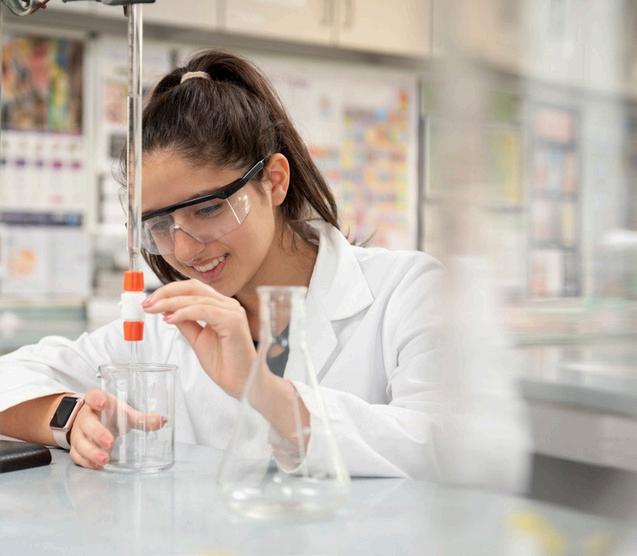
foundational year in Biology sets the stage for deeper exploration in the living world
In Year 8 Chemistry, students commence on an engaging exploration of chemical bonding, formula representation, and transformative chemical processes. They begin by mastering the language of chemistry, learning valency to name elements in compounds and count atoms, and delve into the intricacies of formula naming, including the use of Roman numerals. A deep dive into particle diagrams helps students distinguish between elements, compounds, and molecules, understanding substances at a molecular level The curriculum
covers physical and chemical changes, reversible reactions, displacement, thermal decomposition, oxidation, and reduction, providing a well-rounded understanding of substance transformations Students also conduct experiments to identify gases like hydrogen, carbon dioxide, and oxygen, honing practical skills and applying theoretical knowledge in realworld scenarios Interactive experiments and group activities throughout the year enhance their understanding and foster a hands-on approach to learning chemical principles Year 8 Chemistry at Brighton Girls not only builds a solid foundation in fundamental chemistry concepts but also ignites curiosity and critical thinking, paving the way for advanced scientific studies and exploration
In Year 8 Physics, students dive into the fundamental principles of heat, electricity, magnetism, forces, and space, fostering a deep curiosity and critical thinking about the physical world. They explore particle behaviour in solids, liquids, and gases, and understand the concepts of temperature, heat, and thermal insulation, examining conduction, convection, and radiation
The intriguing realms of electricity and magnetism are introduced, where students learn about static electricity, electromagnets, current, resistance, and electrical circuits The study of speed, acceleration, and various mechanical forces brings to life the principles of motion and forces Students also venture into the cosmos, learning about gravitational forces and celestial bodies, stimulating a sense of awe and curiosity about the universe. Hands-on experiments and practical applications throughout the year reinforce their understanding and demonstrate the relevance of physics in everyday life Year 8 Physics at Brighton
Girls not only builds a strong foundation in fundamental physics concepts but also inspires students to pursue further scientific exploration and appreciate the wonders of the physical world.
In Year 9 Biology, students enter on an engaging exploration of the complexities of life, from the intricate structures of cells to the delicate balance of ecosystems. They study cellular processes like diffusion, osmosis, and active transport, and delve into the anatomy of plants and animals, including the heart and respiratory systems The curriculum also covers ecological research techniques, adaptation, and the dynamics of ecosystems, highlighting the interplay between predators, prey, and extremophiles Through
practical experiments, field studies, and collaborative projects, students gain a hands-on understanding of biology, fostering a deep appreciation for the wonders of life and the importance of preserving our natural world This comprehensive approach in Year 9 Biology cultivates a foundation of knowledge and a passion for scientific discovery, preparing students for future academic pursuits
In Year 9 Chemistry, students dive into the
In Year 9 Physics, students look into the fascinating world of waves and energy, exploring the principles that govern the
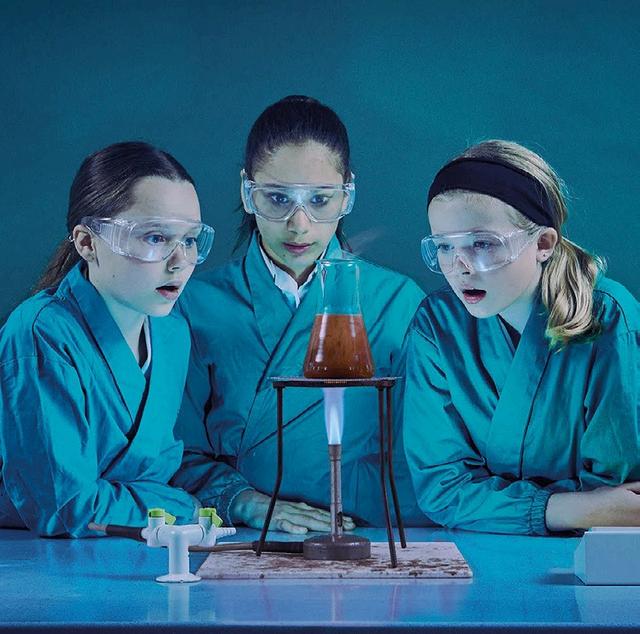
environmental implications of different energy sources Through hands-on experiments and collaborative projects, Year 9 Physics cultivates a comprehensive understanding of key physical concepts, fostering a passion for scientific inquiry and an awareness of physics’ crucial role in our world.
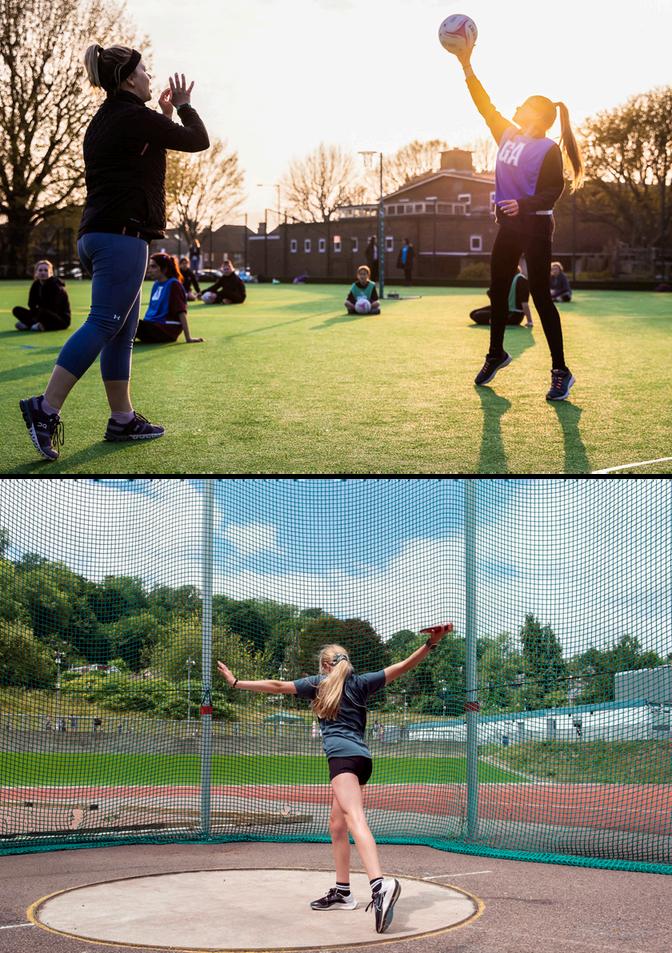
In Year 7 Sport, students engage in a dynamic range of physical activities, fostering both individual talents and team collaboration They explore gymnastics, developing routines with balances and equipment use, and basketball, honing handling, shooting, and strategic play The curriculum also includes netball, emphasising passing and movement strategies, and athletics, where students try various track and field events Skills in rounders and cricket are developed, covering batting, bowling, and fielding techniques This diverse physical education program not only enhances students’ physical abilities but also instils important life skills such as resilience, decisionmaking, and sportsmanship Year 7 Sport provides a vibrant foundation for lifelong fitness, encouraging students to appreciate and excel in a variety of sports
In Year 8 Sport, students deepen their engagement in physical education, refining skills across a variety of sports They advance in gymnastics with vaulting and tumbling, practising more complex routines like handsprings and cartwheels, enhancing creativity and skill Football takes a prominent role, where students develop dribbling, passing, tackling, and shooting techniques, along with a deeper grasp of game dynamics Badminton skills are honed with a focus on overhead clears, drop shots, and strategic gameplay. Athletics continues to be a key part, with students improving in field events like high jump and javelin, and track disciplines like sprints. Rounders and cricket see advanced skill development in batting, bowling, and fielding, enriching the gameplay experience. This dynamic Year 8 Sport
curriculum not only enhances students’ physical abilities but also fosters strategic thinking, teamwork, and sportsmanship, setting a foundation for continued athletic growth and enjoyment in sports.
In Year 9 Sport, students engage in an innovative and diverse physical education curriculum, blending traditional sports with modern disciplines like Urban Gymnastics. They develop skills for efficient movement in urban environments, enhancing agility and creativity The curriculum introduces theoretical aspects of health and fitness, linking fitness components to training methods and exploring intake versus output concepts Students build on their badminton skills with advanced techniques and strategies, and learn handball, focusing on teamwork and strategic thinking. A unique element of design thinking is integrated, where students address real-world sporting issues, developing and presenting innovative solutions Volleyball, athletics, rounders, and cricket are also part of the curriculum, each contributing to the development of specific skills, teamwork, and understanding of game dynamics. Year 9 Sport at Brighton Girls, not only focuses on physical development and sportsmanship but also fosters critical thinking and problem-solving skills, preparing students for a holistic approach to sports and fitness
InYear 7 Wellbeing, students are guided through a curriculum designed to support their transition to senior school and foster a positive learning environment The programme focuses on mental health, emphasising its importance and exploring strategies for maintaining it, linked to positive project work Students learn about the potential dangers in urban areas, enhancing their awareness and understanding of where to seek help The role of friendships and support systems is examined, along with the celebration of cultural diversity during Black History Month Discussions on kindness, peer pressure, and the importance of diverse, tolerant relationships are integral. Reading is highlighted as a tool for mental wellbeing, and students are encouraged to develop organisational skills and responsible use of IT resources The curriculum addresses the risks of smoking and the importance of charitable activities, especially during the Christmas season Year 7 Wellbeing at Brighton Girls aims to nurture students’ personal development, resilience, and a sense of responsibility, creating a supportive and inclusive space for all
In Year 8 Wellbeing, the curriculum is specifically designed to support students’ transition from Year 7 to Year 8, focusing on mental health, evolving friendships, and personal well-being It begins with discussing the changes and social dynamics between the years, emphasising the importance of mental health with strategies to maintain it The programme explores the evolution of friendships during puberty, effective conflict resolution, and the qualities of
good friends Students learn about the risks of vaping and the influence of media on body image, promoting a healthy selfimage and understanding the connection between physical and mental well-being. The importance of tolerance, diversity, and challenging stereotypes is highlighted, along with the impact of words on mental health Continuing from Year 7, the curriculum also includes career exploration and emphasises the value of charitable activities, especially during the festive season. Year 8 Wellbeing at Brighton Girls aims to foster a supportive and inclusive environment, guiding students through their developmental journey with a focus on holistic growth and resilience
In Year 9 Wellbeing, the curriculum is thoughtfully designed to support students as they transition to making crucial decisions about their GCSE options and future careers It covers a broad spectrum of topics, including mental health, sustainability, diversity, and career exploration The programme begins with a discussion on the transition from Year 8 to Year 9, addressing students’ hopes and concerns It delves into the dangers of drugs and the importance of making informed choices, linking these discussions to the promotion of a healthy lifestyle and sustainability The curriculum also focuses on gender and identity, fostering inclusivity and understanding of diverse perspectives, and celebrates cultural awareness during Black History Month Yoga is introduced as a tool for managing mental health, emphasising the mind-body connection Students explore global human rights issues, develop critical thinking skills to discern fake news, and deepen their
understanding of various career paths Charitable activities are emphasised, instilling a sense of responsibility and community engagement Year 9 Wellbeing at Brighton Girls aims to empower students with the knowledge and skills to make informed decisions about their well-being, education, and future, in an inclusive and supportive environment
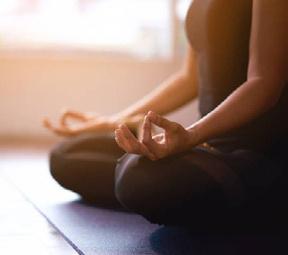
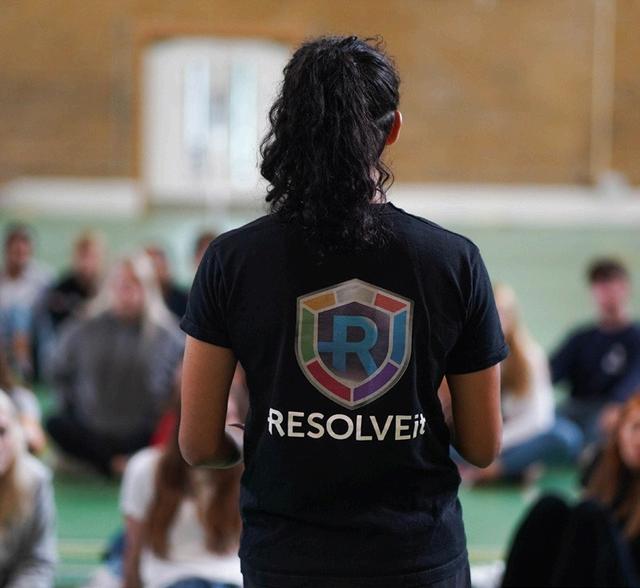
At Brighton Girls, as our students begin on their GCSE journey, they are greeted with a curriculum that offers both depth and breadth, tailored to their unique passions and interests Beyond the foundational pillars of English, Maths, Science, and Languages, our students have the freedom to cultivate expertise in a wide spectrum of subjects. From the intellectual rigour of Classical Civilisation to the modern complexities of Computer Science, our curriculum is designed to align with each student’s strengths and, crucially, their joy in learning
The past year has underscored a vital truth: education is more than exams; it’s a lifelong journey of discovery. In today’s evolving landscape, employers seek more than academic prowess. They value empathy, emotional intelligence, resilience, creativity, and confidence At Brighton Girls, these traits are at the heart of our values and tradition We are committed to nurturing individuals who are both kind and bold. These attributes are not just part of our ethos; they are essential qualities that will stand the test of time and define our students’ futures.
As our students navigate Years 10 and 11, they also begin to cast their eyes towards the horizon, to our Sixth Form and the world that lies beyond our school gates Leadership opportunities abound, from becoming a Peer Supporter to embarking on The Duke of Edinburgh’s Award Scheme These experiences are designed to build confidence, spark creativity, and refine communication skills Through a rich tapestry of clubs, lectures, and leadership roles, we aim to awaken our students to the myriad possibilities that await them, fueling their excitement for the paths they will choose Our goal, through our comprehensive GCSE curriculum and our
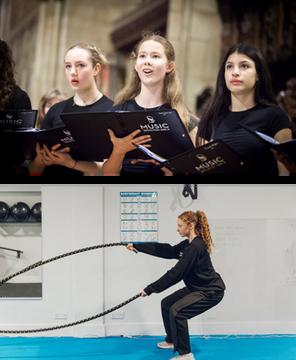
unique, community-driven co-curricular activities, is to equip our students with the skills and determination they need to make a meaningful impact in the world
Our GCSE programme is both robust and diverse All students undertake English Language, English Literature, Mathematics, a Modern Foreign Language, and either three separate science subjects or the Double Award Science, equating to two GCSEs To further broaden their academic horizons, students choose an additional two or three GCSE subjects from an array of options, including Art & Design, Classical Civilisation, Computer Science, Dance, Design & Innovation, Drama, Food Preparation and Nutrition, French, Geography, History, Latin, Music, Physical Education, Philosophy Religion and Ethics, and Spanish
